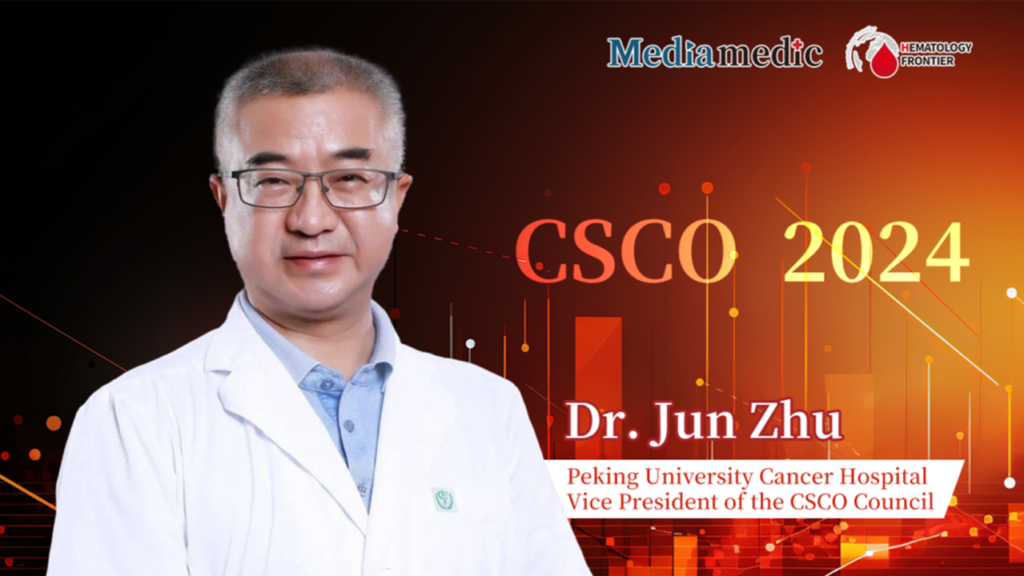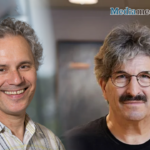
From September 25 to 29, 2024, the 27th Annual Meeting of the Chinese Society of Clinical Oncology (CSCO) was successfully held in Xiamen. Themed Patient-Centered, Sharing the Future, the conference brought together major research advancements and developments from both domestic and international spheres. Over the past two decades, CSCO has been a continuous leader in the development of clinical oncology in China, with numerous experts and scholars contributing to and benefiting from CSCO’s growth. In response to CSCO's initiative, Hematology Frontier established the Growing with CSCO column to look back at the history of this organization alongside Chinese scholars. This issue features an exclusive interview with Dr. Jun Zhu, Vice President of the CSCO Council and Professor at Peking University Cancer Hospital, where he shares his journey of growing with CSCO and highlights the progress and achievements in the field of lymphoma in China.Hematology Frontier: This year’s CSCO conference aims to promote academic exchange and technological cooperation in clinical oncology, encourage clinical research and innovation, and advocate for precision oncology based on multidisciplinary standardized comprehensive treatment. As the Vice President of the CSCO Council, could you share with us the conference’s arrangements in the field of hematologic malignancies this year? What key highlights can attendees look forward to? After walking with CSCO through its decades-long journey, what important developments or changes have left a lasting impression on you?
Dr. Jun Zhu: The 27th CSCO Annual Meeting is not only a vivid reflection of China’s active academic exchanges but also a significant demonstration of CSCO’s unwavering efforts to foster collaboration and development in clinical oncology. It highlights CSCO’s relentless contributions to promoting clinical oncology in China, particularly in the field of new drug development and application.
Since its establishment, CSCO has witnessed China’s remarkable achievements and continuous progress in new drug development, with strategies evolving rapidly and clinical applications constantly innovating. This development, together with the efforts of numerous healthcare professionals, has propelled the growth of clinical oncology in China.
Despite nearly three decades of evolution, CSCO remains steadfast in its original mission, and its core spirit shines even brighter with time. As a physician deeply engaged in hematologic malignancies, I am delighted to see that this year’s conference not only deepened discussions on hematologic and lymphoid malignancies but also highlighted significant breakthroughs in solid tumors such as respiratory, gastrointestinal, breast, and genitourinary cancers, showcasing the breadth and depth of cancer research in China.
Of particular note, the field of hematologic malignancies was given special attention with three dedicated sessions, fostering in-depth exchanges and collaborations between domestic and international experts. This has built a platform for sharing experiences and encouraging innovation, bringing a wealth of cutting-edge insights to all participants.
Of course, we must also acknowledge the gaps that still exist between us and developed countries in certain areas. In the field of hematologic and lymphoid malignancies, especially, we need to accelerate drug development and innovate treatment strategies to close the gap with international standards gradually. Therefore, it is essential to continue exploring the development of efficient and safe therapeutic drugs. Additionally, we must focus on the optimal use of new drugs and refine combination strategies to ensure that medical advancements can benefit a broad range of Chinese patients and contribute to their health and well-being.
Hematology Frontier: As a leading academic organization in oncology in China, CSCO plays a crucial role in developing clinical guidelines and promoting the standardization of clinical trials. In today’s globalized world, how do you think CSCO can strengthen collaboration with international organizations and peers to promote the internationalization of lymphoma clinical trials? What positive impact has CSCO had on accelerating new drug development and improving the quality of clinical trials in lymphoma and oncology in China?
Dr. Jun Zhu: In the current global medical landscape, amid a complex and changing international environment, it is particularly important to strengthen communication and collaboration with peers from abroad. We must face the gap with international standards and actively seek improvement while also recognizing the progress and achievements we have made in cancer treatment and anti-cancer drug development. In this ever-changing global environment, effective communication and information sharing to promote the coordinated development of global healthcare levels is a critical issue that we must think about and address.
Ultimately, the core of cancer treatment lies in independent innovation, and the development of anti-cancer drugs is a vital part of the national healthcare strategy. Chinese doctors need to firmly hold onto the “medicine bottle” in their own hands, securing the initiative in scientific research. Ensuring the self-sufficiency of the “medicine bottle” is not only key to safeguarding national pharmaceutical security but also crucial for advancing China’s medical science and technology to benefit a broad range of Chinese patients. Thus, accelerating the development of anti-cancer drugs should be the shared mission and responsibility of all our colleagues.
From a clinical practice perspective, we should fully leverage CSCO as a platform to promote domestic clinical research cooperation and innovation, bringing together wisdom and strength to accelerate the development and marketing of anti-cancer drugs. Through tireless efforts, we aim to introduce more anti-cancer drugs with independent intellectual property rights into the market and effectively apply them to Chinese cancer patients’ treatment. This is not only the duty of the medical community but also a promise to society and the public.
In this process, we should maintain clear-headedness and take on the responsibility of addressing challenges. It is necessary to face problems directly while actively seeking solutions. At the same time, strengthening communication and cooperation with international peers, learning from advanced experiences, and exploring new paths and methods for cancer treatment together are essential to achieving this goal. It is a challenging but meaningful endeavor. With our continuous efforts, we can certainly contribute Chinese wisdom and strength to global cancer treatment.
Hematology Frontier: From 2015 to 2021, you and your team successfully pushed for the approval of 16 new lymphoma drugs and led or participated in approximately 130 domestic and international clinical trials of new drugs. In the CSCO Lymphoma Guidelines, the research on camrelizumab, tislelizumab, copanlisib, and zanubrutinib, which you led as the principal investigator, has been included. Could you share some key ongoing or soon-to-be-completed clinical trials and their highlights?
Dr. Jun Zhu: The Lymphoma Department at Peking University Cancer Hospital is one of the earliest established specialized lymphoma centers in China. Since its inception, particularly over the past two decades, we have worked closely with colleagues nationwide to drive forward the process of anti-lymphoma drug development in China. We have not only actively introduced innovative drugs from multinational and overseas companies into China but have also focused on supporting domestic companies, particularly those developing new drugs with indigenous intellectual property rights, to pass clinical trials and advance their market availability. During this process, we received strong support from colleagues nationwide and actively learned from international advanced experiences, deepening and broadening domestic and international medical exchanges.
Significantly, our team continues to promote multiple new drugs’ successful market approval in China each year while expanding their indications, benefiting many lymphoma patients. This progress not only provides patients with more treatment options but also greatly enhances the professional growth and skills of our lymphoma specialists. Over the past two decades, we have been deeply involved in more than half of China’s anti-lymphoma drug research and approval efforts. These achievements not only reflect in the approved applications of drugs but also have a far-reaching impact on the revision and improvement of China’s standardized treatment guidelines for lymphoma.
Looking ahead, we are entering a period of robust new drug development. Currently, we have approximately 30 to 40 ongoing clinical trials of new lymphoma drugs in various stages, covering almost all the latest global therapeutic targets and pathways. These include bispecific and multispecific antibodies, small-molecule drugs like BTK inhibitors and PI3K inhibitors, all of which show promising clinical applications. Moreover, cellular therapies, particularly CAR-T cell therapies, are steadily advancing in China. The comprehensive application of these large molecules, small molecules, and cellular therapies significantly enriches the therapeutic options for lymphoma in China, while also allowing our colleagues to gain valuable experience in new drug development, thereby driving continuous progress in the field of hematologic oncology. We must remain confident and continue to make relentless efforts to develop and market more new lymphoma drugs, providing our patients with better treatment options.
Dr. Jun Zhu
- Party Secretary of Peking University Cancer Hospital
- Director of General Medicine and Director of the Lymphoma Department
- Vice President of the Chinese Society of Clinical Oncology (CSCO) Council
- Vice Supervisor of the Supervisory Board of the Chinese Society of Clinical Oncology (CSCO)
- Vice President of Beijing Science and Technology Clinical Oncology Research Foundation
- Chairman of the CSCO Lymphoma Expert Committee
- Vice President of the Beijing Anti-Cancer Association
- President of the Beijing Cancer Rehabilitation Society
- Deputy Chairman of the Oncology Branch of the Chinese Medical Association
- Head of the Blood Tumor Group of the National Health Commission Capacity Building and Continuing Education Oncology Expert Committee


